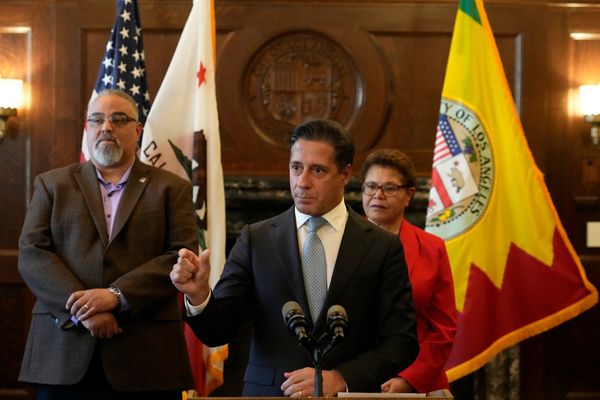PHILADELPHIA — At 35 years old, Careem Hines landed one of his first real jobs.
"I never really had a job because I always ran the street," said Hines. "I was a drug boy."
But after years of jail stints for drug, assault, and gun offenses, a seven-year sentence after a probation violation was the last straw. Hines, 44, now helps run the ShopRite in West Philadelphia's Parkside neighborhood, working as an assistant grocery manager, ordering product, overseeing inventory, and managing associates when needed.
"When I started doing the right thing, everything is ending good," said Hines, who grew up in South Philadelphia's Tasker Homes,
Stories like Hines' — of ex-offenders who got a second chance at life from employment at ShopRite — have become a significant piece of the political platform offered by Democratic mayoral candidate Jeff Brown.
Brown, until his mayoral run, owned the ParkWest ShopRite where Hines works, along with a dozen total grocery stores in his Brown's Super Stores empire, after inheriting the business from his family.
About 20% of Brown's Super Stores employees are returning citizens, or people who have been formerly incarcerated, according to an estimate by the company.
As a first-time candidate in a city that twice elected a progressive district attorney who ran on criminal justice reform, Brown has said he'd try to expand that returning citizens program and give ex-offenders more chances to work.
But some of Brown's opponents have accused him of exaggerating his help.
After Brown said Black people have been his "life's work," and touted the jobs he'd created by putting grocery stores in predominantly Black neighborhoods, mayoral rival Cherelle Parker said Brown had "white privilege wealth." She drew a contrast between primarily Black, hourly workers and the company's executive staff, though Brown's campaign pushed back on Parker's characterization.
Philadelphia is home to 400,000 people with convictions and criminal records. About 40,000 come home from incarceration each year. Brown's Super Stores partner with organizations like Philadelphia Lawyers for Social Equity to provide their employees with record expungement and pardon services at no cost to workers.
According to ex-offenders who are or have been employed with Brown's Super Stores and advocacy groups that work with them, Brown's programs mostly work.
Lamar Hunter manages the Parkside ShopRite bakery and works with Hines.
"A lot of us been kicked and put down a lot," said Hunter. "It means something when you got somebody to actually lift you up instead, and that's what you get in here."
For mothers, though, shifting schedules and location changes at the grocery chain can prove unbearable, even for people who feel it's the only job they can get.
Gainful employment for ex-offenders
Hunter, 36, was caught carrying an unlicensed gun and spent five years in prison before being released in 2021.
He came to ShopRite through Uplift Solutions, a nonprofit Brown founded that includes a returning citizen workforce program. It helps people who've been entangled in the justice system get assistance such as cognitive behavioral therapy and job training.
Brown's company hired its first ex-offender in 1996, said Sandra "Sandy" Brown, Jeff Brown's wife and executive vice president for Brown's Super Stores. Jeff Brown, though, offloaded the business to his son before running for mayor and now holds a 5% stake.
Hunter had prior bakery managing experience and started at $15 an hour before being promoted within just two months. Today, he estimates he makes around $65,000 before taxes.
Wayne Garrett keeps his salary closer to his chest. "I'm not rich but I have everything that I want," is all he'll say.
Garrett, 49, manages a ShopRite in Southwest Philadelphia on Island Avenue. But he started as a cashier making $8.25 an hour.
"I was used to the fast money. Not sitting there [making] $8.25. It got something to do with my ego." After a final, seven-year prison term for robbery, though, Garrett was ready. "I worked like I was getting real good money," he said. Within six months, he was promoted.
He was one of five returning citizens who currently or formerly worked for Brown's Super Stores who spoke with the Inquirer for this story. The Inquirer reached them through social media, advocacy organizations who serve ex-offenders, and through Brown's executives.
Every formerly incarcerated person who spoke to The Inquirer was promoted to some sort of management capacity. According to John Vining, the company'sdirector of human resources, there are no executives who were formerly incarcerated.
Like Hines and Hunter, Garrett was moved from store to store. He's worked in Wyncote, East Norriton, Roxborough, Parkside and Fox Street. The shifting locations and schedule, he said, didn't bother him much. He has a theory about why.
"This might sound harsh but I'm a man. So I'm not usually the one that's gonna be stuck with the kids," said Garrett, who has three grown children. "I don't mean that condescendingly, but usually the children live with their mothers."
Former evening manager Dayna Chandler is a mother. For her, the inflexible scheduling and location switches made a life-saving career unsustainable.
A tearful goodbye to a once-dream job
Chandler was about to end her life. It was 2017 and the mother of three had struggled to find employment since 2012, when she was charged with a disorderly conduct misdemeanor and spent one month in jail. Despite a resume that included jobs as a bank teller and an insurance professional, Chandler said one stupid mistake "ruined my life." Trapped in an abusive relationship, she logged onto Facebook to write her goodbye.
"And the first thing that popped up on my timeline was the flier for Uplift," she recalled. "I felt like that was God talking to me."
She quickly ascended into management before running her own store, with her photo on the wall at the Fresh Grocer on City Avenue. Chandler spent five years as part of Brown's Super Stores, a company she said helped mold her into the woman she is today.
That's why leaving was so heartbreaking.
"I got to the point where I was mentally going insane," she said, getting teary-eyed.
Chandler, 38, felt she lacked support, felt unsafe as a woman evening manager working six nights a week, and endured what she called abuse from customers. The location changes, from Island Avenue close to her Chester home to North Philly, a $70 Uber ride away, strained the young mother.
When the pandemic hit and she had to homeschool her children, scheduling conflicts got worse. Chandler finally quit in 2022. Within a week, she scored a new job 20 minutes from home that gives her more time with her family.
Makeba Champagne said it wasn't unusual to hear this type of feedback from clients of the Home4Good program, which worked with ex-offenders and had what she described as "a really good partnership" with Brown's. Despite Brown's commitment to hiring ex-offenders, Champagne witnessed high employee turnover.
Inflexible schedules made it hard for workers to take on second jobs, Champagne said. "Especially with some of our clients who had children, it was really problematic finding and securing daycare," she added.
Vining, the HR director, said schedules vary frequently but that's part of retail life. "We do our best to work with that," Vining said. As a candidate, Jeff Brown has spoken against Philadelphia's Fair Work Week legislation, designed to help stabilize scheduling for hourly workers.
"As you're there a little bit longer, you get seniority and you can have more of your choice of hours," said Sandy Brown.
Andre Douglas said he saw a lot of single moms at Brown's. "Typically, they would want day schedules so they could get home to their children," he said. "Some of them couldn't get it."
Douglas, 57, spent 33 years incarcerated for robbery and assault and worked at Brown's Super Stores for a year and-a-half. Hewas fired but quickly found new employment and attributes the fast turnaround to his experience at Brown's.
"There was a culture there of second chance," Douglas said.
Hunter goes a step further.
"For a lot of us, it's not a second chance. It's the first chance," he said, "because the reason why you was in the situation was because nobody never gave you a chance."







